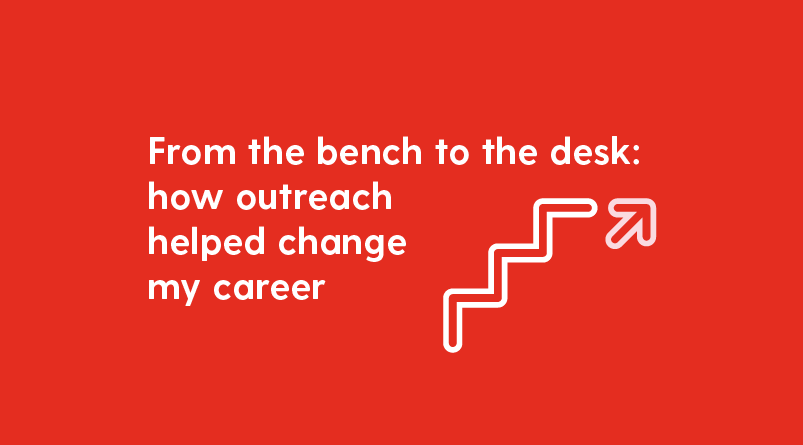From the bench to the desk: how science outreach helped change my career

I clearly remember the day when I decided to become a scientist: I was in high school and suddenly realised that science was the only subject I could follow without forcing my mind to stay focused. A few years forward, I also clearly remember when I sought my supervisor for advice about my future after my PhD thesis defense. At that moment, I was not sure whether I wanted a career as a Principal Investigator/Group Leader but he said ‘You did a PhD, what else do you think you could possible do?’ Though he spoke quite bluntly, in a sense I thought he was right…What on earth could you do in your life if you had embraced the academic career path up to now?
At that time I was randomly applying to everything I could find that was not lab bench related. I didn’t know what else I could or wanted to do. Of course, I ended up doing a post-doc. I will never forget the day I packed my life in a suitcase and moved to ecstatic London with my own fellowship to do research at a top UK institution. That day I didn’t feel very ecstatic. I was nervous and committed to making the most out of my professional future.
How do you know what you want to do if the only thing you have ever done (and known around you) is working in the lab? Well, you better start somewhere, and volunteering was for me the best way to expose myself to possible careers and try them out. I filled up my – little – free time with all sort of volunteer activities: from school events to writing and editing for blogs and journals. Surprisingly, doing these science-related-not-bench-dependent activities made me a better scientist. When you explain your scientific ideas to a group of pupils and try to answer their tricky questions, you understand better the impact of your work. In addition, if you learn to find weaknesses and strengths in someone else’s work you can do the same to your own beloved research project. Eventually, by being exposed to different volunteer experiences, I found my path.
I love science, I still do. However, I mostly love talking about science, organizing science-related events, and help people improve their scientific knowledge. Volunteering as project manager for Native Scientist has given me the unique opportunity to discover and develop all these skills in one go. Having to find and establish new contacts, organize (and sometimes deliver) workshops and manage all the communication afterwards has been very rewarding and, most importantly, is an essential plus on my CV which has helped me to get where I am now. When my post-doc experience was coming to an end, I got a job as Programme Manager at Imperial College London. On my work, I deal with everything regarding the use of animals in research and the 3Rs (replacement, reduction, refinement) principle: organizing and delivering courses, looking for grants and fellowships, managing the webpage or being part of advisory committees. I’m still surrounded by science (even more than before), but far away from the bench, finally!
If I could go back in time, I would do everything again - exactly as I did it! Getting a degree in biotechnology, doing a PhD and then a post-doc, has given me limitless amount of skills that I could not have acquired in any other way. Those skills, transferable skills, are the most important things I got in my life. Only when I started to get as much out-of-the-lab experience as possible, I realized that I actually had them. Every undergrad, PhD student or post-doc acquires a set of skills while doing science that can be translated into a wide variety of professional futures. For certain jobs, these skills may need to be complemented with specific training, but many times they are sufficient. You just need to be aware of them!
Although along the way I felt that pursuing an academic career was the only option, I’ve learned the hard way that this is the biggest lie all students and scientist are being told. If at any point you realise that lab work is actually not your cup of tea, you are not and you will never be a failed scientist. “They are not alternative careers, they are just careers,” said Francis Collins, renowned scientist and director of the US National Institutes of Health, in an interview to Nature.
To give up the lab bench is not an easy step to do. It took me 4 years of PhD to come to the conclusion that bench work was not my passion, 4 years of post-doc to get ready for the next move, and several rounds of applications to be offered a job position that suited me. Importantly, every single step helped me get to the final goal. So, whatever you are going to do with your life, always keep this in mind: never give up!

About the author: Anna Napolitano
Anna Napolitano is currently working as QA and 3Rs Programme Manager at the Imperial College London. She is an immunologist with years of experience working in academic research teams across Europe. Anna has always had a big passion for science communication. She is a highly-motivated person that works hard to achieve her goals.
Further reading:
- leaving the ivory tower (Science);
- life after academia (Nature News);
- away from the bench (Nature Blog).



